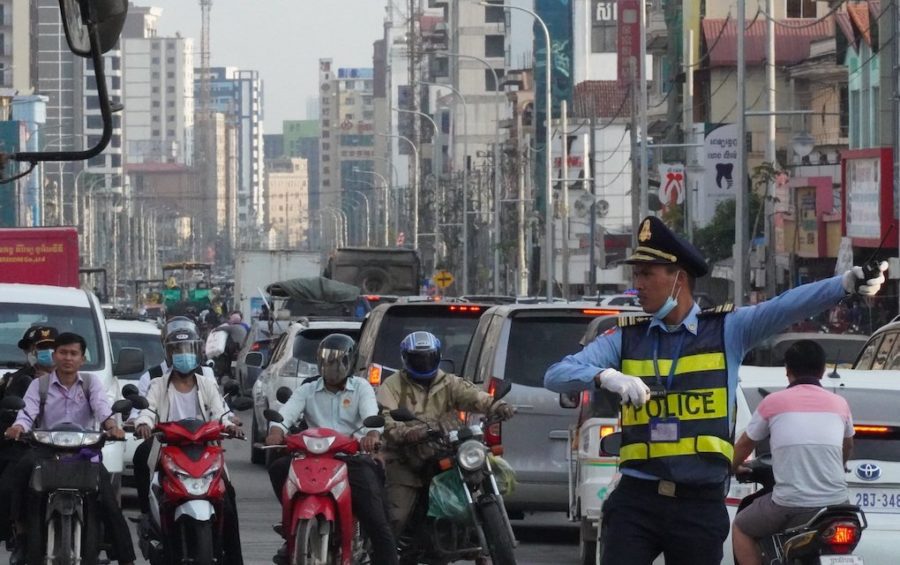A “student movement” that grew out of nationalistic protests in the late 1990s and is now U.S.-based is raising a debate over the abusive nature of online discourse in Cambodian politics, putting a spotlight on fissures in the country’s outlawed opposition.
Touch Vibol, executive director of the Student Movement for Democracy (SMD), said in a statement this week that critics had been twisting the group’s words using abusive language, curses and insults.
Vibol said the vitriol came particularly from supporters of Prime Minister Hun Sen as well as those of CNRP co-founder Sam Rainsy.
The SMD has recently been posting Facebook messages criticizing Rainsy’s political deal two decades ago with Hun Sen. Rainsy, a long-time opposition politician now living in exile in France, has long attracted loyal, fervent support from Cambodians abroad and those critical of the government.
In 2006, Rainsy proposed a Constitutional amendment allowing parties to form a government with just 50 percent plus one vote, down from the previous requirement for two-thirds support.
“From now on we are confident Cambodia will have political stability,” Rainsy said at the time. The amendment, while opening up the possibility for an opposition party to gain power in Cambodia, also reduced the ruling CPP’s need to compromise or work with opposition parties in order to govern.
The SMD’s recent Facebook posts about the mid-2000s deal opened up one of the many festering old wounds of Cambodian politics.
On Facebook, user Aing Sopharith said the group “deserve to be insulted.” “You guys, SMD, try so hard to color, stimulate, break up, distort the truth,” Sopharith said.
“If [you] have not done something, you would not have been insulted. You have to look at your own actions. There is a reason, there will be an effect,” said another user, Sophal Tep.
“[You] see only others’ faults and say good about yourself. If you do not attack others, they will not retaliate against your group,” said Ta Sour.
In his statement this week, Vibol said Facebook insults were becoming the political culture of Cambodia, calling his group the victim.
Despite the “student” name, the group’s leadership are veteran activists and commentators — Vibol is a Khmer Rouge survivor whose address is listed as North Carolina, and the group’s vice chairman is Kim Sok, a political analyst living in exile in Finland. The group also goes by the name Cambodia Democracy Council.
Sok said this week that Cambodian political discourse needed to move beyond name-calling.
“The Cambodian people suffer because of injustice, and the Cambodian people become lost because of politicians who exaggerate without political virtue. So only when we treat this injustice and this unholy game of exaggerations can we find prosperity for the people. And in order to cure these two diseases, we must take a stand to tell the truth,” Sok said.
The SMD emerged from violent post-election protests in 1998 that became wrapped up in racial politics, including students taking a sledgehammer to the Cambodia-Vietnam Liberation Monument. Vibol was among the student leaders of the SMD in the late 1990s.
The CNRP’s other co-founder, Kem Sokha, was accused in court at the time of inciting violence and racial hatred.
This week, Ou Chanrath, a former opposition lawmaker close to Kem Sokha, said he agreed with the SMD’s message.
“It’s hard to correct. But I still think that a correction must start from a change in mindset to make people start to understand,” Chanrath said.
The opposition factions of Rainsy and Sokha have long bickered — with the rhetoric between supporters often rising to hostility. But more recently, several opposition politicians linked to Sokha have also broken from the CNRP, including to try to form new parties. Chanrath, former CNRP vice president Pol Ham and Sokha adviser Muth Chantha are among two dozen opposition officials who have sought political “rehabilitation.”
Sokha is still facing a trial for alleged treason and banned from politics, though speculation is recurrent that a potential deal with the ruling party could see him return to politics.
Ruling CPP spokesman Sok Eysan said the SMD statement was just another case of infighting among the CNRP, which was dissolved by the Supreme Court in 2017.
They “did not get along with each other from the beginning,” Eysan said.
Nevertheless, heated debate was expected in politics, he added. “Because of different views, there are always inevitable clashes with one another. It is normal,” Eysan said.
Pa Chanroeun, director of the Democratic Institute of Cambodia, said political insults may have a long tradition in the country, but they still obstructed progress. Political activists should focus on policies rather than personal attacks, he said.
“The path of the old political culture is very difficult to change,” Chanroeun said. “But if the new generation or the next generation of politicians do not change, do not deviate from the path of the old politicians, it could make the political environment in Cambodia even more gloomy, and direct confrontation, both verbally and in other forms, could cause catastrophe in our society.”
(Translated and edited from the original article on VOD Khmer)












